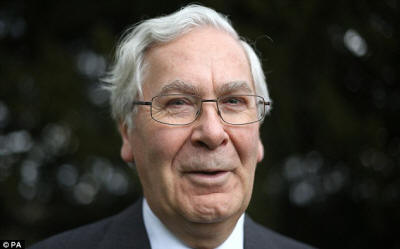
by Rupert Steiner
23 June 2013
from
DailyMail Website
Central Banks Told Enough is Enough
in A Call that Says Continued Stimulus
Measures
will 'Hurt' Financial Stability
Governments around the world, including the UK, have been warned in an
influential new report to stop relying on their central banks to kick-start
growth.
Just days before Sir Mervyn King (pictured below) hands over the keys
of the Bank of England to successor Mark Carney, the Bank of
International Settlements (BIS),
which represents the world’s central banks, said its members have already
done enough to aid a recovery and more stimulus measures would only hurt
financial stability.
In the same week that Ben Bernanke - chairman of America’s
Federal Reserve - signaled an end to
quantitative easing, BIS called for banks
to step back.

Passing the baton:
Outgoing Bank of England
governor Sir Mervyn King
has now handed over its
reigns to Mark Carney
At its annual meeting in Basel, BIS general manager Jaime Caruana
said:
‘Extending monetary stimulus is taking the
pressure off those who need to act. Ultra-low interest rates encourage
the build-up of even more debt. In fact total debt, private and public,
has generally increased as a share of GDP since 2007.’
In its annual report BIS said:
‘After all, cheap money makes it easier to
borrow than to save, easier to spend than to tax, easier to remain the
same than to change.’
Caruana lambasted firms and households as well
as the public sector for not making good use of the time bought by
‘ultra-loose’ monetary policy.
He said this had ended up creating new financial strains and delaying rather
than encouraging necessary economic adjustments. BIS, also known as the
central bankers club, was one of the few organizations to foresee the global
financial crisis that erupted in 2008.
Caruana said:
‘Since the beginning of the financial
crisis, central banks have supported the global economy with
unprecedented measures.
‘Without these forceful and determined policy responses, the global
financial system could have easily collapsed, bringing the world economy
down with it.
‘But easy financial conditions can do only so much to revitalise
long-term growth when balance sheets are impaired and resources are
misallocated on a large scale.
‘Central banks have borrowed the time that the private and public
sectors need for adjustment, but they cannot substitute for it.’
In its main economic review for the year, BIS
points out that since the beginning of the global financial crisis, robust,
self-sustaining growth still eludes the global economy and governments need
to use a different mix of policies to achieve it.

